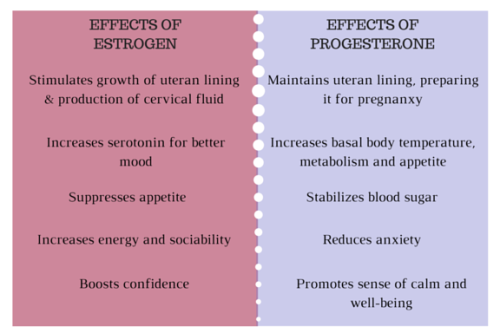As women, I’m sure a number of us have heard the criticism or at least are aware of the stereotype that we’re more emotional, cry on the job, have mood swings, so on and so forth. And the truth is our female brain is wired differently than the brains of our male counterparts. Our systems are more complex and more intricate. We are more emotional.
For starters, our monthly reproductive hormone cycle is at least five times more complex than men’s. Men begin the day with high testosterone and it dissipates throughout the day. They make more testosterone while they are sleeping, and the cycle repeats.
Women, on the other hand, have a monthly rhythm in which estrogen rises during the first half and falls during the second half, with an inverse correlation of progesterone. Testosterone is typically highest when estrogen is highest (around ovulation). Testosterone is associated with confidence and increased libido. Estrogen is related to greater sociability and energy. Progesterone boosts our metabolism and also has a calming, anti-anxiety affect on our system.

Image Courtesy of http://www.liberawellness.com
These reproductive hormones have a substantial affect on our mood and energy levels on their own. Additionally, they interact with other hormones and neurotransmitters and their receptors throughout our body. Most importantly for our moods, they affect the levels of serotonin and dopamine.
Furthermore, a woman’s brain structure is even calibrated to be more sensitive to emotions – both our own and those around us. Women use the right side of their brain, connected to emotion and emotion processing, more often than men. Brain imaging also shows that women have more areas of the brain dedicated to gut feelings, and areas that assess the thoughts of others.
As psychiatrist Julie Holland wrote in this must-read New York Times op-ed, we are this way due to “evolutionary design” – being more in tune with emotions helps us better understand the needs of our children and to more accurately assess our partners’ intentions. Both of these things were necessary to our survival and the survival of the species. Likewise, the intricate cycle of reproductive of hormones in women enable us to facilitate and sustain life during conception and pregnancy.
The emotionality that comes with these strengths and abilities is a sign of health. However, I’ll be the first to admit that the emotional components are not always the most easily dealt with – and sometimes it can feel like they sneak up on you. Here’s what you can expect throughout the month and some best practices to even out the highs and lows:
Cycle Week One:
Your monthly cycle begins with the first day of menstrual bleeding. At this time, your reproductive hormone levels are at their lowest. This often correlates with low energy, and often low mood. Be sure to build in time for rest and to avoid strenuous exercise. Your intuition will be heightened during this time as activity in the corpus callosom, which connects the right and left hemispheres of your brain, is increased.
Cycle Week Two:
Towards the end of your period, your estrogen levels will begin to increase. By a few days after your last bleeding day, your energy will increase with the added estrogen. Estrogen also seems to correlate with higher levels of serotonin, a neurotransmitter responsible for positive mood. As you near the end of week two, your body will be gearing up for ovulation. This will be accompanied by a higher level of testosterone, boosting both your sex drive and confidence levels.
Cycle Week Three:
At the beginning of week three, you will have just ovulated or will be ovulating. (Most women ovulate between days 13 and 17 of their cycle.) You will be vivacious, full of energy, and confident. This is the time to schedule public presentations, meetings with your boss to discuss that raise, or a first date. Your body will also enjoy strenuous exercise during this time.
Towards the end of week three, your estrogen levels will drop and your body will start to produce progesterone. Progesterone will raise your body temperature, often correlating with an increased metabolism and appetite. You may begin to feel a bit calmer and introspective.
Cycle Week Four:
The severe drop of estrogen will result in lower energy levels. You may find that you are unable to do the same workout routines you were able to do just a week ago with ease. As progesterone levels peak, your brain will start to prioritize attention to detail. Progesterone is the pregnancy hormone and you find yourself more inclined towards nesting activities, or find that you are more emotional. Build in some extra time for rest and practice some self care rituals. Taking care of yourself now will prep your body for a better period and start of the next cycle.
Remember that fluctuations in your mood and energy levels are normal – they’re part of what makes you the fierce woman and life-creating force that you are.




